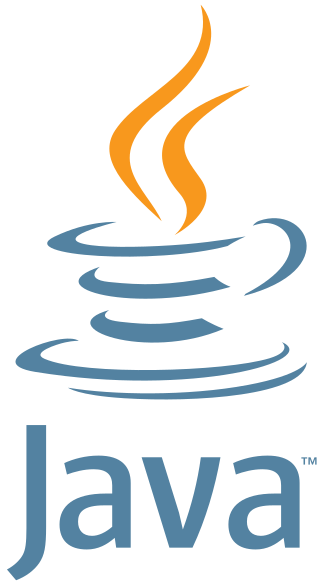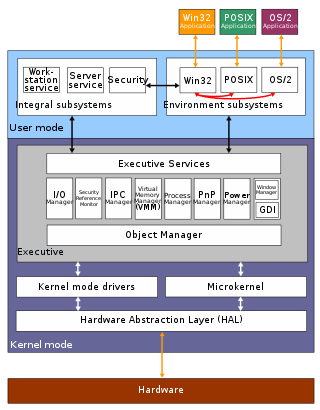
Java is a high-level, class-based, object-oriented programming language that is designed to have as few implementation dependencies as possible. It is a general-purpose programming language intended to let programmers write once, run anywhere (WORA), meaning that compiled Java code can run on all platforms that support Java without the need to recompile. Java applications are typically compiled to bytecode that can run on any Java virtual machine (JVM) regardless of the underlying computer architecture. The syntax of Java is similar to C and C++, but has fewer low-level facilities than either of them. The Java runtime provides dynamic capabilities that are typically not available in traditional compiled languages.

The Windows API, informally WinAPI, is the foundational application programming interface (API) that allows a computer program to access the features of the Microsoft Windows operating system in which the program is running.

In computer programming, a shim is a library that transparently intercepts API calls and changes the arguments passed, handles the operation itself or redirects the operation elsewhere. Shims can be used to support an old API in a newer environment, or a new API in an older environment. Shims can also be used for running programs on different software platforms than they were developed for.
REST is a software architectural style that was created to guide the design and development of the architecture for the World Wide Web. REST defines a set of constraints for how the architecture of a distributed, Internet-scale hypermedia system, such as the Web, should behave. The REST architectural style emphasises uniform interfaces, independent deployment of components, the scalability of interactions between them, and creating a layered architecture to promote caching to reduce user-perceived latency, enforce security, and encapsulate legacy systems.

A web API is an application programming interface (API) for either a web server or a web browser. As a web development concept, it can be related to a web application's client side. A server-side web API consists of one or more publicly exposed endpoints to a defined request–response message system, typically expressed in JSON or XML by means of an HTTP-based web server. A server API (SAPI) is not considered a server-side web API, unless it is publicly accessible by a remote web application.
The Microsoft Windows platform specific Cryptographic Application Programming Interface is an application programming interface included with Microsoft Windows operating systems that provides services to enable developers to secure Windows-based applications using cryptography. It is a set of dynamically linked libraries that provides an abstraction layer which isolates programmers from the code used to encrypt the data. The Crypto API was first introduced in Windows NT 4.0 and enhanced in subsequent versions.
The Speech Application Programming Interface or SAPI is an API developed by Microsoft to allow the use of speech recognition and speech synthesis within Windows applications. To date, a number of versions of the API have been released, which have shipped either as part of a Speech SDK or as part of the Windows OS itself. Applications that use SAPI include Microsoft Office, Microsoft Agent and Microsoft Speech Server.
Google Developers is Google's site for software development tools and platforms, application programming interfaces (APIs), and technical resources. The site contains documentation on using Google developer tools and APIs—including discussion groups and blogs for developers using Google's developer products.
The Microsoft Windows operating system supports a form of shared libraries known as "dynamic-link libraries", which are code libraries that can be used by multiple processes while only one copy is loaded into memory. This article provides an overview of the core libraries that are included with every modern Windows installation, on top of which most Windows applications are built.
An open API is a publicly available application programming interface that provides developers with programmatic access to a software application or web service. Open APIs are APIs that are published on the internet and are free to access by consumers.
The Facebook Platform is the set of services, tools, and products provided by the social networking service Facebook for third-party developers to create their own applications and services that access data in Facebook.

Google App Engine is a cloud computing platform used as a service for developing and hosting web applications. Applications are sandboxed and run across multiple Google-managed servers. GAE supports automatic scaling for web applications, allocating more resources to the web application as the amount of requests increases. It was released as a preview in April 2008 and launched officially in September 2011.
The Indexed Database API is a JavaScript application programming interface (API) provided by web browsers for managing a NoSQL database of objects. It is a standard maintained by the World Wide Web Consortium (W3C).
An application programming interface (API) is a connection between computers or between computer programs. It is a type of software interface, offering a service to other pieces of software. A document or standard that describes how to build such a connection or interface is called an API specification. A computer system that meets this standard is said to implement or expose an API. The term API may refer either to the specification or to the implementation.
Amazon's Product Advertising API, formerly Amazon Associates Web Service (A2S) and before that known as Amazon E-Commerce Service (ECS), is a web service and application programming interface (API) that gives application programmers access to Amazon's product catalog data. Accessible via either the SOAP or REST protocols it enables products to be listed and/or sold through third-party websites and applications. It is a product of Amazon Services, not to be confused with Amazon Web Services.

Google Cloud Messaging (GCM) was a mobile notification service developed by Google that enables third-party application developers to send notification data or information from developer-run servers to applications that target the Google Android Operating System, as well as applications or extensions developed for the Google Chrome internet browser. It was available to developers free of charge. The GCM Service was first announced in June 2012 as a successor to Google's now-defunct Android Cloud to Device Messaging (C2DM) service, citing improvements to authentication and delivery, new API endpoints and messaging parameters, and the removal of limitations on API send-rates and message sizes. It has been superseded by Google's Firebase Cloud Messaging (FCM) on May 29, 2019.
Google APIs are application programming interfaces (APIs) developed by Google which allow communication with Google Services and their integration to other services. Examples of these include Search, Gmail, Translate or Google Maps. Third-party apps can use these APIs to take advantage of or extend the functionality of the existing services.
Google Play Services is a proprietary software package produced by Google for installation on Android devices. It consists of background services and libraries for use by mobile apps running on the device. When it was introduced in 2012, it provided access to the Google+ APIs and OAuth 2.0. It expanded to cover a variety of Google services, allowing applications to communicate with the services through common means.
Apache Kafka is a distributed event store and stream-processing platform. It is an open-source system developed by the Apache Software Foundation written in Java and Scala. The project aims to provide a unified, high-throughput, low-latency platform for handling real-time data feeds. Kafka can connect to external systems via Kafka Connect, and provides the Kafka Streams libraries for stream processing applications. Kafka uses a binary TCP-based protocol that is optimized for efficiency and relies on a "message set" abstraction that naturally groups messages together to reduce the overhead of the network roundtrip. This "leads to larger network packets, larger sequential disk operations, contiguous memory blocks [...] which allows Kafka to turn a bursty stream of random message writes into linear writes."
Kubernetes is an open-source container orchestration system for automating software deployment, scaling, and management. Originally designed by Google, the project is now maintained by a worldwide community of contributors, and the trademark is held by the Cloud Native Computing Foundation.





